 September 22, 2016 John E. Ross, KD8IDJ, Editor
| ||||||||
Momentum Building to Urge Senate Passage of the Amateur Radio Parity Act The response to ARRL's call to action urging the support of US Senators for the Amateur Radio Parity Act, H.R. 1301, has been gratifying -- although the campaign continues. More than 50,000 e-mails have been sent to Capitol Hill via Rally Congress, and all 100 US Senate members have been contacted. The League continues to encourage members of the Amateur Radio community who have not yet done so to reach out to their two US Senators seeking their support. Just where things stand with respect to the bill's future in the US Senate is not yet entirely clear.
On September 12, the US House of Representatives approved H.R. 1301 on a voice vote under a suspension of the rules, culminating many years of effort on ARRL's part to gain legislation that would enable radio amateurs living in deed-restricted communities to erect antennas that support Amateur Radio communication. The bill calls on the FCC to amend its Part 97 rules "to prohibit the application to amateur stations of certain private land-use restrictions, and for other purposes." Shepherded by ARRL, the overwhelming grassroots support for H.R. 1301 from the Amateur Radio community was credited for getting the bill through the US House, but it faces significant obstacles to passage in the US Senate. The earlier US Senate version of the bill, S. 1685, no longer is in play, and the Senate is expected to vote on the version of H.R. 1301 that the House adopted this month. The vote came after ARRL worked with the Community Association Institute -- which represents homeowners associations -- to develop language that both organizations could support. Rally Congress makes it easy to generate letters to Senators in support of The Amateur Radio Parity Act. The entire process takes just a couple of minutes. "So it is critical that ARRL members continue to write their Senators," Lisenco urged. "To those who have already written, thank you! If you haven't done so already, please do so today. We can only do so much. After that, it becomes the responsibility of the membership to participate." As the amended bill provides, "Community associations should fairly administer private land-use regulations in the interest of their communities, while nevertheless permitting the installation and maintenance of effective outdoor Amateur Radio antennas. There exist antenna designs and installations that can be consistent with the aesthetics and physical characteristics of land and structures in community associations while accommodating communications in the Amateur Radio services." More information on The Amateur Radio Parity Act is on the ARRL website. AT&T's New "AirGig" is Not Your Father's BPL Recalling the earlier efforts of the FCC and telecommunications and utility interests to roll out "Broadband over Power Line" (BPL) technology, the Amateur Radio community has been buzzing with questions about AT&T's just-announced "AirGig" BPL plan to make broadband available via apparently similar technology. ARRL's earlier anti-BPL campaign, and market forces, eventually led to the demise of the prior BPL initiative. ARRL Laboratory Manager Ed Hare, W1RFI, who spearheaded the earlier effort to quantify BPL's threat to Amateur Radio's HF spectrum and remains the resident expert on the subject, said this newest BPL incarnation should not pose an interference issue for radio amateurs.
"This technology uses millimeter-wave RF signals (30 GHz to 300 GHz) coupled onto the surface of power lines to transmit the signal along the line with relatively low losses," Hare explained. "After looking at this technology, it looks nothing like the type of HF and VHF BPL that caused us so many problems years ago. The sky is not falling." Hare added that it is not likely that the AT&T technology will even use Amateur Radio bands, so there is little reason for concern even among those amateurs who use spectrum above 24 GHz. According to AT&T's September 20 announcement, the company is "deep in the experimentation phase" of the developing technology, which it says would be "easier to deploy than fiber, can run over license-free spectrum, and can deliver ultra-fast wireless connectivity to any home or handheld wireless device." AT&T said its initial -- and continuing -- testing at AT&T outdoor facilities "has been positive," and initial field trials are set to begin in 2017. Hare said the League will keep an eye and ear out for interference problems, but he believes that the frequencies involved and the fact that these signals should not propagate far from the lines will pose little risk to the Amateur Radio Service. Read more. Get Set for the SET: ARRL 2016 Simulated Emergency Test is October 1-2 Weekend The primary focal point of the 2016 ARRL Simulated Emergency Test (SET) is just ahead -- Saturday and Sunday, October 1 and 2. The national emergency exercise is aimed at testing the skills and preparedness of the Amateur Radio Emergency Service (ARES) and other organizations that are called into action in actual emergency situations. "Every local ARES team and/or ARRL Section will come up with their own scenarios and work with served agencies and partner organizations during the SET," ARRL Field Organization Team Supervisor Steve Ewald, WV1X, said, noting that not all SETs will take place on October 1 and 2.
"SETs can be scheduled at the local and Section levels and conducted throughout the fall to help maximize participation," he said. "But ARRL Field Organization leaders have the option of conducting their SETs on another weekend, if October 1 and 2 is not convenient." ARRL Field Organization leaders are among those tasked with developing plans and scenarios for this year's SET, Ewald explained. "The SET invites all radio amateurs to become aware of emergency preparedness and available training," Ewald said. "ARES, Radio Amateur Civil Emergency Service (RACES), National Traffic Systemâ¢, SKYWARN, Community Emergency Response Team (CERT), Salvation Army Team Emergency Radio Network (SATERN), and other allied groups and public service-oriented radio amateurs are encouraged to participate." The object of the annual nationwide exercise is to test training and skills and to try out new methods. "It's a time to work with partner organizations and served agencies to get to know them better and to determine their needs before an emergency or disaster strikes," Ewald said. "Knowing who to contact within partner groups and knowing the planned procedures will help everyone to accomplish their goals and succeed in their missions. To get involved, contact your local ARRL Emergency Coordinator or Net Manager. See the ARRL Sections web pages or your ARRL Section Manager (see page 16 of QST for contact information). Read more. The Doctor Will See You Now! "Coping with the Solar Minimum" is the topic of the latest (September 22) episode of the "ARRL The Doctor is In" podcast. Listen...and learn!
Every 2 weeks, your host, QST Editor in Chief Steve Ford, WB8IMY, and the Doctor himself, Joel Hallas, W1ZR, will discuss a broad range of technical topics. You can also e-mail your questions to doctor@arrl.org, and the Doctor may answer them in a future podcast. Enjoy "ARRL The Doctor is In" on Apple iTunes, or by using your iPhone or iPad podcast app (just search for "ARRL The Doctor is In"). You can also listen online at Blubrry, or at Stitcher (free registration required, or browse the site as a guest) and through the free Stitcher app for iOS, Kindle, or Android devices. If you've never listened to a podcast before, download our beginner's guide. National Parks on the Air Update More than 650,000 contacts have been logged for ARRL's National Parks on the Air (NPOTA) program. This comes from over 12,000 different activations of over 450 eligible NPOTA units from 1,178 Activators. One of those activators is Bob Voss, N4CD. Bob is incredibly active in county hunting, and has transmitted from all 3077 US counties twice. Bob has also been an NPOTA road warrior, activating better than 230 unique NPOTA units from his mobile station. Bob is wrapping up another of his multi-state trips, with activations from Louisiana to the Eastern Seaboard. Look for him this weekend from the Washington, DC area; he says he'll probably head out on another NPOTA adventure in November. Fifty activations are slated for September 22-28, including Chaco Culture National Historical Park in New Mexico, and Canyonlands National Park in Utah. Details about these and other upcoming activations can be found on the NPOTA Activations calendar. Keep up with the latest NPOTA news on Facebook. Follow NPOTA on Twitter (@ARRL_NPOTA). A Record Breaker on 630 Meters! Although US radio amateurs do not yet have access to 630 meters, Canadian licensees do, and one of them was on the North American end of the first two-way contact on that band between Canada and Australia. Steve McDonald, VE7SL, in British Columbia, and Roger Crofts, VK4YB, in Queensland, completed a contact on September 15 between 1225 and 1319 UTC using JT9 digital mode. The distance covered was on the order of 7000 miles.
"This morning a historic QSO for the Amateur Service was completed!" commented John Langridge, KB5NJD, who also holds an FCC Part 5 Experimental license, WG2XIQ. "This is also the longest two-way QSO on 630 meters ever completed." The contact took place on 474.300 kHz. McDonald said band conditions were just good enough to get the job done. "Well, it wasn't pretty as in 'pretty-quick,' but it's done," he told Langridge in recounting the contact. McDonald told ARRL that the band "was not particularly good this far north and was much better just a few hundred miles to my south," but had been improving "little by little." Crofts agreed that he and McDonald had a tough time of it. "It was a real struggle, but finally got there," he told Langridge in an e-mail. "I thought we were going to miss out, because all the big signals had taken a dive. Obviously the path to VE7 was still hanging in there."
McDonald said his antenna is "basically about the size of a 160 meter inverted L, but over extremely poor ground," while Crofts, with what McDonald described as "a monster antenna" was doing the heavy lifting for the contact. McDonald was using a transverter that VK4YB had sent him for beta testing, driving an LF MOSFET amplifier converted for 630 meter use. Meanwhile. Joe Lowe, NU6O, in California, reports that VK4YB also heard his WI2XBQ Experimental Service beacon on September 14. "I was running 0.5 W ERP, 50 W TPO, into a 43-foot vertical in the backyard," he told ARRL. "Very low power and simple equipment are capable of DX on 630 meters!" Lowe said he was using WSPR mode. An April 2015 FCC Report and Order, Order, and Notice of Proposed Rulemaking (R&O/NPRM) proposed a new secondary 630 meter MF allocation at 472 to 479 kHz to Amateur Radio, implementing decisions made at WRC-12. It also allocated 135.7 to 137.8 kHz to the Amateur Service on a secondary basis. A Report and Order is pending. "Cows Over the World" DXpedition Tour to Resume Tom Callas, KC0W, reports his all-CW "Cows Over the World" DXpeditions will resume with his T30COW operation from Western Kiribati, September 25-October 24. "My proposed 'Top 25 Most Wanted' DXpeditions is not going to happen," he said on his QRZ.com page. "Sorry for getting anyone's hopes up." He's still awaiting permission to operate from Tokelau and Nauru. Callas said all requests to visit Tokelau (ZK3) are reviewed by tribal elders, a process that "takes a long time," he said in a September 20 update to his QRZ.com page. "If no firm progress has been made by December, I will DX from Nauru until -- hopefully -- I receive the official okay to visit Tokelau," he said. If he has to wait longer than that, he will operate from Fiji, taking advantage of the 3D2KOW license he's been issued for a DXpedition in 2017. He expects to be in the Solomon Islands, operating as H44COW from October 25 to November 26. Callas runs 500 W into vertical antennas over salt water, and is active in all major CW contests. He updates his activities on QRZ.com. QSL direct via KC0W only. A log search will be available on ClubLog. -- Thanks to Southgate Amateur Radio News via OPDX; The Daily DX FCC Updates Notice on Amateur Radio Operation in CEPT Countries The FCC has updated its Public Notice on Amateur Radio operation in European Conference of Postal and Telecommunications Administrations (CEPT) countries that have adopted certain recommendations regarding the US. The updated notice, in English, German, and French, includes some additional countries where operation is permitted. Licensees operating in CEPT countries must have a copy of the Public Notice, proof of US citizenship, and evidence of an FCC Amateur Radio license grant. These must be shown to "proper authorities" upon request.
Advanced or Amateur Extra class operators are granted CEPT Radio Amateur License privileges, in accordance with CEPT Recommendation T/R 61-01 (as amended). General class operators are granted CEPT Novice Radio Amateur License privileges, in accordance with ECC Recommendation (05)06 (as amended). The Public Notice includes complete details. Read more. Limor Fried, AC2SN, Named Among Most Influential Women in Internet of Things Industry The Internet of Things (IoT) Institute has named ARRL member Limor Fried, AC2SN, of New York City as one of the 25 most influential women in the IoT industry. IoT embraces the concept of connecting devices from cell phones to appliances and machine components to the Internet and/or to each other. Individuals were named on the basis of attainment of leadership roles related to IoT, hands-on experience developing IoT technology, outstanding research related to IoT, and social reach, among other factors.
Fried founded the open-source hardware firm Adafruit from her MIT dorm room in 2005. The Manhattan-based company, which now employs more than 50 people, offers tools, equipment, and electronic components targeted at the "maker" audience, including IoT technology. She was the first female engineer to appear on the cover of WIRED and was Entrepreneur magazine's Entrepreneur of the Year for 2012. In June, Fried was designated as a White House Champion of Change. As Adafruit's sole owner, Fried has become known for creating resources for and supporting the learning of electronics for makers of all ages and skill levels. World War II Norwegian Resistance Member Haakon Sorbye, LA8Y, SK World War II Norwegian resistance activist Haakon Sorbye, LA8Y, of Trondheim, Norway, died on September 15. He was 96. In 1939, the year after World War II erupted in Europe, Sorbye, then an engineering student and young radio amateur, first enlisted as a telegrapher in the Norwegian military.
After Norway surrendered to the Nazis, he joined the Norwegian resistance and became part of the "Skylark B" group -- one of two radio communication teams that relayed to London information on the movement of German troops and supplies. The mostly student Skylark B team also alerted London when the Germans captured the world's first plant to mass-produce heavy water -- a building block for the atomic bomb. Most Skylark B members eventually were arrested by the Nazis, and seven of them died in extermination camps. Sorbye survived, however, and was rescued by the "White Buses" -- an operation carried out by Swedish Red Cross members in early 1945 that saved more than 15,000 concentration camp survivors. Following the war, Sorbye returned to school, eventually becoming a professor of telematics at the Norwegian Institute of Technology. In addition to the Defence Medal awarded to military and civilian personnel who took part in fighting the German invasion and occupation of Norway, he was decorated with the King's Medal for Courage in the Cause of Freedom. -- Thanks to Pete Varounis, NL7XM Past ARRL Oregon Section Manager Randy Stimson, KZ7T, SK
He was elected to the position in 2004, and he served until 2006, making him Oregon's longest-serving SM. In addition to ham radio, Stimson was active for many years in Cycle Oregon. A service will be held in Spokane, Washington, on September 24. -- Thanks to Everett Curry, W6ABM In Brief...
One Radio Amateur Among Expedition 49/50 Crew Members Headed to ISS: Three Expedition 49/50 crew members will head to the International Space Station on Friday, September 23. Astronaut Shane Kimbrough, KE5HOD, and cosmonauts Sergey Ryzhikov and Andrey Borisenko will head into space from the Baikonur Cosmodrome in Kazakhstan. They will spend approximately 5 months aboard the orbital complex before returning to Earth in late February. Kimbrough, Ryzhikov, and Borisenko will join Expedition 49 Commander Anatoly Ivanishin and his crewmates -- Kate Rubins, KG5FYJ, and Takuya Onishi, KF5LKS, who have been on station since July. Between launch and docking, the trio will spend 2 days in the Soyuz MS-02, testing system upgrades. NASA TV will provide live coverage of the launch and docking.
The K7RA Solar Update Tad Cook, K7RA, Seattle, reports: Sunspot numbers and solar flux were down over our September 15-21 reporting week. The average daily sunspot number was 29.9, down from 50.1 during the previous 7 days. Average daily solar flux dipped from 88.9 to 83.4. Geomagnetic indices were up a bit, with the average daily planetary A index rising from 6.7 to 8.9, and the average daily mid-latitude A index moving from 6.1 to 7.6. The predicted average planetary A index for the next 7 days is expected to rise to 13.1, and the average solar flux to 86.4, according to the latest 45-day outlook.
The predicted planetary A index is 8 on September 22-23; 5, 8, 18, and 10 on October 24-27; 35 on September 28-29; 32 on September 30; 30 and 18 on October 1-2; 15 on October 3-5; 5 on October 6-15; 18, 20, 12, and 8 on October 16-19; 5 on October 20-22; 15 and 10 on October 23-24, and 35 on October 25-27. Thursday, September 22 is the autumnal equinox, and the first day of fall. This should herald better HF propagation than we've seen in the past couple of months, and Spaceweather.com reports that this is also the start of the aurora season. Sunspot numbers for September 15 through 21 were 12, 13, 14, 47, 56, 32, and 35, with a mean of 29.9. The 10.7 centimeter flux was 84.4, 83.7, 80.3, 83, 82.6, 84.5, and 85.5, with a mean of 83.4. Estimated planetary A indices were 7, 3, 4, 9, 10, 19, and 10, with a mean of 8.9. Estimated mid-latitude A indices were 6, 3, 4, 8, 8, 15, and 9, with a mean of 7.6. Send me your reports and observations.
. . . . . . . Just Ahead in Radiosport
Upcoming ARRL Section, State, and Division Conventions
Find conventions and hamfests in your area.
. .
Subscribe to...
Free of charge to ARRL members...
| ||||||||
(1).jpg) "As of this moment, we have no date set for action by the Senate," said ARRL Hudson Division Director Mike Lisenco, N2YBB, who has been deeply involved in promoting passage of the legislation. "The Senate will adjourn the September work period soon and members will return home to campaign. If we do not achieve consideration before they go into hiatus, we will have to wait until they return after Election Day."
"As of this moment, we have no date set for action by the Senate," said ARRL Hudson Division Director Mike Lisenco, N2YBB, who has been deeply involved in promoting passage of the legislation. "The Senate will adjourn the September work period soon and members will return home to campaign. If we do not achieve consideration before they go into hiatus, we will have to wait until they return after Election Day."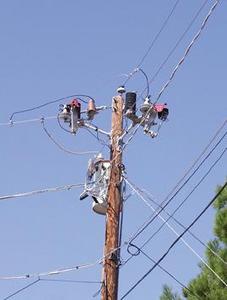
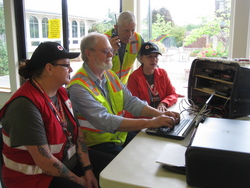
.jpg) Sponsored by
Sponsored by 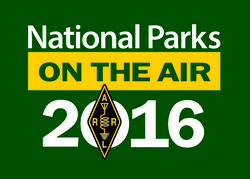
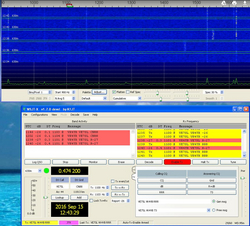
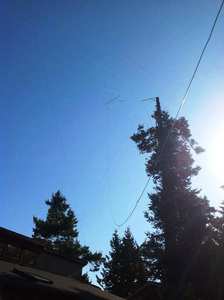

.jpg) Subject to regulations in force in the country visited, a US citizen holding an FCC General, Advanced, or Amateur Extra Class Amateur Radio license grant "is authorized to utilize temporarily an Amateur Station in a [CEPT] country that has implemented certain recommendations with respect to the United States."
Subject to regulations in force in the country visited, a US citizen holding an FCC General, Advanced, or Amateur Extra Class Amateur Radio license grant "is authorized to utilize temporarily an Amateur Station in a [CEPT] country that has implemented certain recommendations with respect to the United States.".JPG)
.jpg)
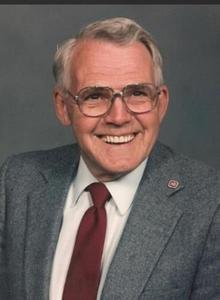 Former ARRL Oregon Section Manager Randy Stimson, KZ7T, died on September 10, after a period of declining health. He was 82. Stimson served as Oregon SM from 1987 until 1998. In 2003, he was appointed to fill a vacancy in the SM post.
Former ARRL Oregon Section Manager Randy Stimson, KZ7T, died on September 10, after a period of declining health. He was 82. Stimson served as Oregon SM from 1987 until 1998. In 2003, he was appointed to fill a vacancy in the SM post.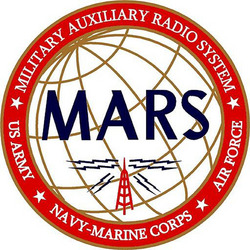 Amateur Radio-Military Interoperability Exercise Set for October 31-November 1: An Amateur Radio-military interoperability exercise will take place October 31-November 1. The event will begin at 1200 UTC on October 31 and continue through 2359 UTC on November 1 on 60 meter channels 1-4 --5.3305 MHz, 5.3465 MHz, 5.357 MHz, and 5.3715 MHz, respectively. During this exercise, military stations will attempt to make radio contact with stations in as many of the 3077 US counties as possible. Radio amateurs providing "county status" information will receive a US Department of Defense "interoperability QSL card." For more information,
Amateur Radio-Military Interoperability Exercise Set for October 31-November 1: An Amateur Radio-military interoperability exercise will take place October 31-November 1. The event will begin at 1200 UTC on October 31 and continue through 2359 UTC on November 1 on 60 meter channels 1-4 --5.3305 MHz, 5.3465 MHz, 5.357 MHz, and 5.3715 MHz, respectively. During this exercise, military stations will attempt to make radio contact with stations in as many of the 3077 US counties as possible. Radio amateurs providing "county status" information will receive a US Department of Defense "interoperability QSL card." For more information, 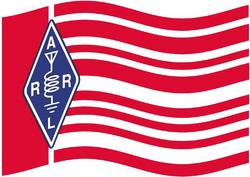 New Section Manager Appointed in Northern New Jersey: Steve Ostrove, K2SO, of Elizabeth, New Jersey, was appointed as ARRL Northern New Jersey Section Manager, effective September 16. He takes the reins of the Northern New Jersey Field Organization after Richard Krohn, N2SMV, announced his resignation after serving as SM since July 2008. ARRL Field Services and Radiosport Manager Dave Patton, NN1N, received Krohn's resignation and recommendation for his replacement and consulted with ARRL Hudson Division Director Mike Lisenco, N2YBB, before making the appointment. Ostrove will complete the current term of office that extends until June 30, 2017. Ostrove has served as Assistant Section Manager in Northern New Jersey since 2009, and was the Section Emergency Coordinator from 2001 through 2008. He is a District Emergency Coordinator, Official Emergency Station, and Official Relay Station.
New Section Manager Appointed in Northern New Jersey: Steve Ostrove, K2SO, of Elizabeth, New Jersey, was appointed as ARRL Northern New Jersey Section Manager, effective September 16. He takes the reins of the Northern New Jersey Field Organization after Richard Krohn, N2SMV, announced his resignation after serving as SM since July 2008. ARRL Field Services and Radiosport Manager Dave Patton, NN1N, received Krohn's resignation and recommendation for his replacement and consulted with ARRL Hudson Division Director Mike Lisenco, N2YBB, before making the appointment. Ostrove will complete the current term of office that extends until June 30, 2017. Ostrove has served as Assistant Section Manager in Northern New Jersey since 2009, and was the Section Emergency Coordinator from 2001 through 2008. He is a District Emergency Coordinator, Official Emergency Station, and Official Relay Station.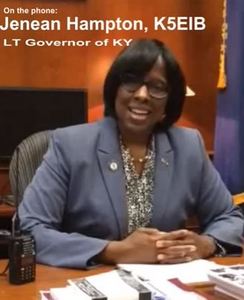 Kentucky Lieutenant Governor and Radio Amateur Talks Ham Radio during Hamfest, Interview: ARRL member Jenean Hampton, K5EIB, the relatively new Lieutenant Governor of Kentucky, was a guest of honor at the
Kentucky Lieutenant Governor and Radio Amateur Talks Ham Radio during Hamfest, Interview: ARRL member Jenean Hampton, K5EIB, the relatively new Lieutenant Governor of Kentucky, was a guest of honor at the ,%20Sergey%20Ryzhikov%20(center)%20and%20Andrey%20Borisenko.jpg)
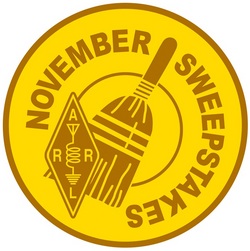 ARRL November Sweepstakes Operating Period is 30 Hours: The 2016
ARRL November Sweepstakes Operating Period is 30 Hours: The 2016 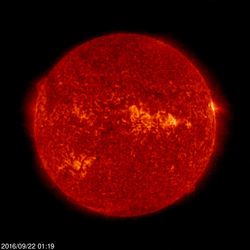 Predicted solar flux is 85 on September 22-24; 90 on September 25-26; 85 on September 27-29; 95 on September 30-October 2; 90 on October 3-6; 85 on October 7-13; 80 on October 14-15; 85 on October 16-20; 88, 90, and 95 on October 21-23; 100 on October 24-27, and 95 on October 28-29.
Predicted solar flux is 85 on September 22-24; 90 on September 25-26; 85 on September 27-29; 95 on September 30-October 2; 90 on October 3-6; 85 on October 7-13; 80 on October 14-15; 85 on October 16-20; 88, 90, and 95 on October 21-23; 100 on October 24-27, and 95 on October 28-29.








